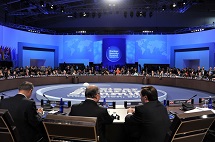Miles Pomper
February 26, 2016
 The following is an excerpt of an article published February 25 by the Bulletin of Atomic Scientists.
The following is an excerpt of an article published February 25 by the Bulletin of Atomic Scientists.
“Laura Holgate, the US envoy to the Nuclear Security Summit, likes to compare the series of biannual meetings initiated by President Barack Obama in 2010 to a “sprint in the middle of a marathon.” The metaphor is an apt one. Like sprinters, summit participants moved quickly to achieve some concrete accomplishments, departing from the usual languid pace of multilateral diplomacy. Yet the need for short-term, demonstrable results appears to have exhausted the states involved. At the fourth and final summit beginning March 31, they will bring the process to an end, stopping well short of the ultimate finish line: a point where all high-risk nuclear and radiological materials and facilities are rigorously protected from theft or sabotage. As a result, it will largely fall to the next US president and the rest of the international community to muster a second wind and sufficient stamina to finish the race.
“When Obama came to office, he sought to build on past nuclear security efforts, particularly those of President George W. Bush. After the 9/11 attacks, the Bush administration led international efforts to negotiate two nuclear security accords—a 2005 amendment to the Convention on Physical Protection of Nuclear Material (CPPNM), and the International Convention for the Suppression of Nuclear Terrorism (ICSANT). The former for the first time required states party to provide appropriate physical protection of nuclear materials on their own territory. The latter facilitated prosecutions and extraditions related to nuclear terrorism. The Bush administration also ramped up spending to secure or remove dangerous materials from civil use—particularly highly enriched uranium (HEU), viewed by many experts as the fissile material terrorists might most easily use in a nuclear device. A particular Bush success was working with Russia to extend such efforts to other former Eastern Bloc states.”
